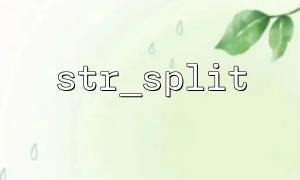In PHP, str_split is a commonly used string processing function that divides strings into small substrings. However, while this function is very effective when dealing with regular ASCII strings, you may experience some compatibility issues when it is used with UTF-8 encoded strings. This article will explore why this happens and provide possible solutions.
The function of the str_split function is to split a string into multiple substrings according to the specified length and return an array. For example:
$str = "HelloWorld";
$result = str_split($str, 5);
print_r($result);
The output result will be:
Array
(
[0] => Hello
[1] => World
)
This feature is very intuitive and effective in ASCII strings because the number of bytes per character is consistent. However, the situation is different under UTF-8 encoding.
UTF-8 is a variable-length character encoding that allows each character to be represented by 1 to 4 bytes. For basic character sets such as English, UTF-8 uses 1 byte, but for characters such as Chinese and Japanese, UTF-8 encoding uses 3 to 4 bytes. Therefore, when splitting UTF-8-encoded strings using str_split , problems may arise if they are split by a fixed number of bytes.
For example, consider the following UTF-8 encoded string:
$str = "HelloWorld";
"Hello" here uses 6 bytes, while "World" uses 5 bytes. If str_split($str, 3) is used, PHP will split the string every 3 bytes, resulting in the Chinese characters "you" and "good" being split into two parts, and these characters should be a whole.
$str = "HelloWorld";
$result = str_split($str, 3);
print_r($result);
The output may be:
Array
(
[0] => you
[1] => good
[2] => Wor
[3] => ld
)
You can see that str_split splits a character (such as "you") into multiple parts, resulting in incomplete Chinese characters. Such a segmentation not only affects the integrity of the string, but may also lead to problems on display.
The root cause of the problem is that the number of bytes in UTF-8 encoded characters is not uniform. PHP's str_split function operates on bytes, not characters. Therefore, when str_split is used to split a UTF-8-encoded string, it ignores the actual boundaries of the characters, which may cause the characters to be truncated or split into multiple parts.
To better understand this problem, we can think of it as a Unicode character encoding problem. If you split directly by bytes, the integrity of characters cannot be guaranteed, especially multi-byte characters.
The solution to this problem is to avoid splitting UTF-8 strings directly using str_split . Instead, we can use PHP functions that are more suitable for handling multibyte characters, such as mb_str_split , which is part of the mbstring extension and can be split correctly based on characters rather than bytes.
Example of using mb_str_split :
$str = "HelloWorld";
$result = mb_str_split($str, 1, 'UTF-8');
print_r($result);
The output will be:
Array
(
[0] => you
[1] => good
[2] => W
[3] => o
[4] => r
[5] => l
[6] => d
)
With mb_str_split , each character is split correctly, avoiding the problem of splitting Chinese characters. It should be noted that when using mbstring extension, you must make sure it is installed and enabled.
When PHP's str_split function handles UTF-8-encoded strings, it may cause incorrect splitting due to inconsistent number of character bytes encoded by UTF-8, especially when the string contains multibyte characters. To avoid this problem, mb_str_split can be used to correctly split UTF-8 encoded strings to ensure character integrity.
In actual development, we should consider using functions that support multibyte characters, especially when we deal with internationalized strings. This not only prevents characters from being split by mistake, but also improves code compatibility and stability.














